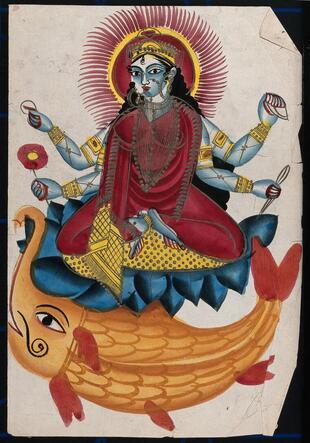 Saraswati sitting on a lotus with her elephant fish. Coloured lithograph. Wellcome Collection. Saraswati sitting on a lotus with her elephant fish. Coloured lithograph. Wellcome Collection. I wrote and recorded the poem "Sarasvati" as part of a collaborative poetry performance and book, "An Exaltation of Goddesses," in tribute to archaeomythologist Marija Gimbutas. The video performance/film will premiere at the 2021 ASWM Online Symposium, Wisdom Across the Ages: Celebrating the Centennial of Archaeomythologist Marija Gimbutas (July 16-18, 2021). Here is my note about the poem, which, along with the poem itself, appears in a book collecting the thirteen poems that make up "An Exaltation of Goddesses." A NOTE ON WRITING "SARASVATI" What does it mean to write a poem about Sarasvati now of all times? What is she asking of us? What can we ask of her? In South Asia, unlike in the West, the goddess did not disappear—she continues to be venerated in the living tradition, which has developed varied theologies in relation to her. The goddess has many forms, many names through the length and the breadth of the land. As a signifier, she has often been cherry-picked by caste-based patriarchy and reactionary Hindu nationalism for ends that skitter far away from spiritual meaning. This makes the discursive field around goddess-centered spirituality contentious for artists and scholars located within contemporary contexts of social change in South Asia. Sarasvati, considered to be the presiding deity of learning and the arts, is an important goddess in the Hindu pantheon—finding a significant place even in Buddhist and Jain pantheons. While writing this poem, even as I wanted to invoke the qualities of wisdom Sarasvati embodies, I wanted to bring in my ambivalence about the ideals of femininity—specifically for women of words, a way of being cultured—portrayed in her iconography and mythology, reinforcing a Brahmanical epistemology of perfection and purity. To trouble these representations, I turned to the imagery of her as a river. In my poem, Sarasvati is still wild. In the Rig Veda, Sarasvati is spoken of as a ‘mighty’ and ‘uncontrollable’ river; later texts describe her as a ‘disappearing’ river who becomes ‘invisible’. This is not a poem in which I chart the journey of the river’s disappearance, or that of the river goddess becoming the goddess of knowledge, even as—following the work of scholars including Catherine Ludvik—I see the mysteries of the later transformation encoded within associations, noted in the Rig Veda, of the river goddess with dhi (inspired thought) and with vac (speech). I also wanted the poem to acknowledge that, for Hindutva, finding the lost river Sarasvati has become a svarna mriga (golden deer)—a lure through which they seek to assert the civilizational superiority of ‘Aryavarta’—the land of the Aryans. I wanted to explore if there is a different possibility that an invocation of Sarasvati could raise. In terms of form, I was thinking of Enheduanna’s use of the first person in the hymn, “Exaltation of Inanna”— how she interweaves a cultural, political, and personal narrative with the praise of Inanna. I was attentive to the ecology of sound within the poem, especially since Sarasvati embodies the power of sound. Bibliography Abraham, Shirley, and Amit Madheshiya. “A Mythical River Flows Through Indian Politics.” The New York Times, 10 July 2018. Danino, Michel. The Lost River: On the Trail of the Sarasvati. Penguin, 2010. Ghosh, Niranjan. Śrī Sarasvatī in Indian Art and Literature. Sri Satguru Publications, 1984. Kinsley, David R. Hindu Goddesses: Visions of the Divine Feminine in the Hindu Religious Tradition. Berkeley: University of California Press, 1986. Ludvik, Catherine. Sarasvatī: Riverine Goddess of Knowledge. Brill, 2007. Shaw, Miranda E. Buddhist Goddesses of India. Princeton, N.J: Princeton University Press, 2006.
0 Comments
Your comment will be posted after it is approved.
Leave a Reply. |
Get updates of New blog postsconnect with me ON SOCIALSArchives
April 2024
|
 RSS Feed
RSS Feed